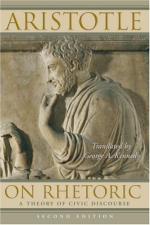
|
| Name: _________________________ | Period: ___________________ |
This test consists of 5 short answer questions, 10 short essay questions, and 1 (of 3) essay topics.
Short Answer Questions
1. How did Aristotle think rhetoric could be useful in terms of one's beliefs?
2. How did Aristotle define calmness?
3. What did Aristotle say was the chief concern of political rhetoric?
4. In contrast to syllogism, how did Aristotle explain the difference between the arguments in enthymemes?
5. Which one of the following was not listed by Aristotle as a form of happiness?
Short Essay Questions
1. What were the two types of laws explained in Book I, Chapter 10?
2. How were the three main areas of rhetoric introduced by Aristotle?
3. How was justice described by Aristotle and why was virtue a significant part of rhetoric?
4. How was the emotional appeal defined by Aristotle?
5. Which tactics did Aristotle indicate a epideictic rhetorician could use?
6. Which points of view could the law be observed by a legal rhetorician?
7. What definition did Aristotle give for 'rhetoric' at the beginning of the book?
8. Which causes of human action did Aristotle outline in Book I, Chapter 10, and which ones were voluntary?
9. What were some of the aspects of anger and calmness that Aristotle discussed in the book?
10. What benefits might ancient witnesses and recent witnesses have for legal rhetoric?
Essay Topics
Write an essay for ONE of the following topics:
Essay Topic 1
Feelings and emotions were present in both powerful speaking and rhetoric.
1) Describe ten of the emotions that Aristotle included in the book, their characteristics, and how they can influence a person's actions
2) Explain the origin of feelings and emotions, and why they are important in rhetoric.
3) Analyze the effect that emotion has in rhetoric, its ability to gain the trust of the audience and when it should be included in a speech.
Essay Topic 2
Aristotle's life and background had a key part in the success of his writings on rhetoric.
1) Describe the time period in which Aristotle lived, his background, and his intentions when writing the book.
2) Explain Aristotle's writing style and three examples of the techniques he used.
3) Analyze the effect that Aristotle's background and writing style had on his work in On Rhetoric: A Theory of Civic Discourse.
Essay Topic 3
Argumentation was the basis for rhetoric and oration.
1) Describe the types of argumentation used in each main form of rhetoric.
2) Explain Aristotle's theory of possibility and impossibility, along with three examples of it.
3) Analyze which forms of rhetoric might use Aristotle's theory of possibility and impossibility the most and why.
|
This section contains 949 words (approx. 4 pages at 300 words per page) |

|




